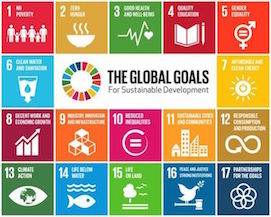Achieving SDGs by 2030 is a collective responsibility – Ghartey
 Mrs Gladys Ghartey, Chief Economic Officer and Head of UN System Unit at the Ministry of Finance, has called for a collective and coherent effort by all stakeholders to achieve the UN Sustainable Development Goals (SDGs).
Mrs Gladys Ghartey, Chief Economic Officer and Head of UN System Unit at the Ministry of Finance, has called for a collective and coherent effort by all stakeholders to achieve the UN Sustainable Development Goals (SDGs).
All the 17 goals and 232 targets are interconnected and demanded the unflinching support, experience, expertise and a multifaceted approach to achieve the goals by 2030.
Ms Ghartey made the call at a day’s workshop on “increasing awareness and knowledge on SDGs as well as generate input for the Voluntary National Reviews (VNR)” , held in Cape Coast on Tuesday.
The National Development Planning Commission (NDPC) organized the programme, which targeted media personnel, as well as representatives from the National Commission for Civic Education (NCCE), Information Services Department (ISD), Regional Coordinating Council (RCC), and security agencies.
The forum was geared towards deepening the understanding of the participants on the SDGs to enable them report accurately on issues relating to the goals.
In September 2015, world leaders, adopted the 2030 Agenda for Sustainable Development framework to succeed the Millennium Development Goals (MDGs) as the basic survival paradigm.
Mrs Ghartey said achieving the SDGs was bedevilled by myriads of challenges and added that poverty reduction has been hindered by the lack of economic growth and further complicated by the high levels of income inequality among others.
To address the challenge, she said Government has embarked on a number of strategic initiatives and engagements with CSOs and the private sector to ensure the effective implementation of the SDGs.
The stakeholders have actively participated in the process to develop the national SDGs monitoring framework- a process that led to agreeing on indicators to be monitored, selection of consultants to conduct the baseline survey, review of the proposals and terms of reference and the final selection of the qualified consultant for the assignment.
The report, Mrs Ghartey said, was one of the few national documents that has been jointly developed by government, CSOs and other relevant stakeholders with key strategies and procedures to achieving the goals.
The SDGs have been consistent with Ghana’s development aspirations and about 70 per cent of its targets were reflected in policies and strategies of the just ended Medium-Term National Development Policy Framework (2014-2017), which preceded the 2030 Agenda.
They would also actively engage in public sensitisation and dissemination of the report; stating that, “this is indeed the dividend of the multi-stakeholder platform put in place to implement and monitor the implementation of the SDGs”, she said.
Mrs Hellen Ayitevie, Head of SDGs Secretariat at the Ghana Statistical Service, urged the media to regularly update themselves with timely and accurate information on national strategy development goals to serve as the guide to enable them monitor, contribute and report effectively to ease the process of achieving the targets by 2030.
She said the media is a strategic partner in creating public awareness on the progress and challenges and called on the participants to work hard to promote the targets under the SDGs for the benefit of the nation.
Ms Sylvia Senu, an Economic Analyst with the UNDP, who gave an overview of the Millennium Development Goals (MDGs), described Ghana’s achievement as remarkable and rallied the support of all towards its success.
Amidst challenges such as effective government leadership, policy gaps, inclusive participation, budgeting constraints among others, the achievement of the SDGs is the surest way to bring development and peace to the world, she said.
Source: GNA
